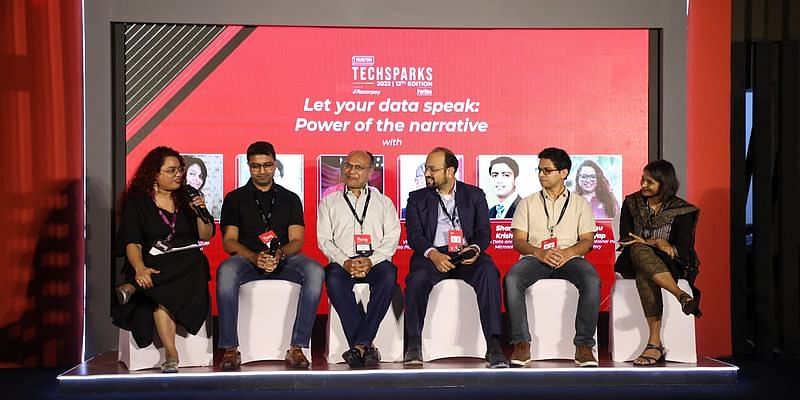Be it user data, application performance logs or campaign yields, data scientists are constantly working towards leveraging and making the most of this data in both big enterprises as well as startups. Data Science is not only enabling enterprises to measure, track and record performance, but also helping in using these metrics for facilitating enterprise-wide enhanced decision making.
Day 2 of TechSparks 2022 saw a panel discussion on ‘Let your data speak – Power of the narrative’, where industry leaders spoke about what to keep in mind while defining data strategies and the future of data mining technologies.
The panel featured Himani Agarwal, Country Head, Azure, Microsoft India; Saurabh Odhyan, CTO – Consumer, FreshToHome; Piyush Gupta, Chief Data Scientist, PayU; Mohit Kumar, VP and Head of Data Science, Data Platform and Product Analytics, Udaan; and Shanoop Krishnan, Lead – Azure Data and AI, Digital Natives, Microsoft India.
The need to invest in data
Data is the new oil of the digital era, an immensely untapped asset. And just like oil, it is invaluable in its raw form. While organisations are collecting a huge amount of data today, it needs to be deciphered intelligently so that business users are able to leverage and use that in the right context. “Data is one of the most important resources that differentiates companies of today from those of yesterday. We have seen a lot of disruption happening in a plenty of industries, and the biggest differentiator is data. Data can be the moat of a business,” exclaimed Saurabh.
Emphasising on the need to embed data in every business workflow and treat data as a means to an end and not the end itself, Mohit derived an interesting analogy. “Data is the new electricity in the sense that it should be used as pervasive as possible. It is so pervasive everywhere, that you don’t even feel that it’s there,” he said.
While collection of data is one thing, driving analytics out of it and running models and AI on top of it is a fairly hard thing to do. However, it is impertinent to analyse and use data in the right context for scaling. Using the data in a more productive way not only helps in improving customer experience, but also in retaining customers and achieving tangible benefits.
Adding to this, Piyush of PayU said, “It’s easy to copy products, it’s easier to copy features, but it’s much harder to copy data. So if data is your mode, there are higher chances that you will succeed compared to anything else.”
What defines a good data strategy?
The basis of a good data strategy lies in evolving as the organisation grows. It cannot be static and has to change as the organisation scales. The biggest challenge in forming data strategies comes in when an enterprise or a startup needs to balance what they believe in, where they are currently, and the next problem they are aiming to solve.
The other aspect that comes into play is related to open source and tooling to enable the company, be it a startup or an enterprise, to actually make use of the right data. “A good data strategy needs to have both these aspects, which is the functional aspect of getting the right data as well as making sure the instrumentations are there for using that data wisely,” explained Mohit.
Leveraging data while keeping costs in check
Leveraging data efficiently and effectively can be a fairly expensive proposition. Data strategies need to be aligned to the growth of the company to keep the costs in check, specially in a startup scenario. “It’s very hard to define an ROI for data teams, but you have to look at them as enablers for your entire business. Without them you’re going to have a very hard time efficiently running the business or scaling it up,” said Piyush.
While technology and data platforms are big enablers, they need to be used wisely to keep the costs in mind. Going for the right open source solutions like those offered by Microsoft in addition to hosted solutions can help organisations leverage data. “The trust builds up if we are able to bring innovations and additional capabilities to ensure that we help our data users do the right things at the right time and at the right price,” said Shanoop.
Security, compliance, and future of data mining technologies
As the laws around data security and privacy are getting tighter globally, it has become pertinent that the customer data and information is being used in a compliant way. Microsoft has offered various solutions in terms of built-in security in their products. They not only help users offload hard work and overheads involved in the infamous security audits but also bring in security and transparency.
“At Microsoft trust and transparency is at the core of all we do. The data that you have put in the cloud is your data, you have full control on that data. So all the security and governance laws are all governed by the compliance and the different regulations that are in place,” said Himani.
Building real-time data, and using AI/ML more pervasively for improved consumer experiences were the top thoughts of all panelists. Going forward with the idea that data should enable the consumer to live life in a much more comfortable way and in a much easier and seamless manner, the future of data mining technologies promises to be a safe, secure and a comfortable route for organisations as well as consumers.











